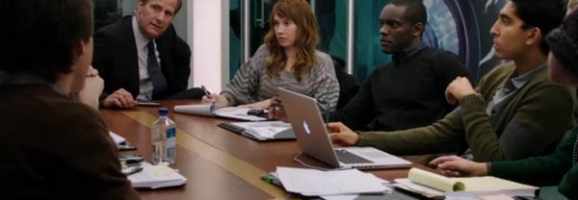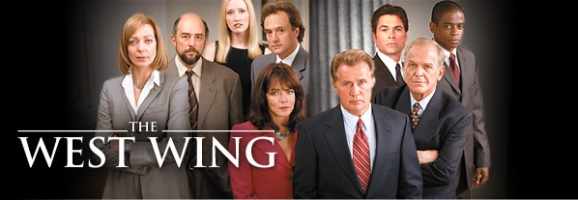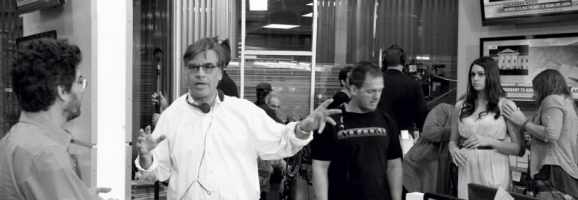4 Elements ‘The Newsroom’ Must Change for Season Two
July 14th sees the return of Aaron Sorkin’s The Newsroom on HBO, the first season of which was met with mixed reviews. Some love it, while others find it hokey and the writing clumsy at best.
Personally, I am in the latter camp. There were many things wrong with the first season, but there were enough good moments to make me think that it can be a good show.
What Sorkin needs to do in the second season is give the show its own identity and stop trying to relive his past glories. He has an instantly recognisable style that has been honed but subsequently over-used. He needs to move away from that if the concept of The Newsroom is going to work.
Arguably Sorkin’s finest work is The West Wing, where his irreverent style was at its most effective and his writing at its most powerful. There are many elements that worked well in WW that don’t seem to work at all in NR, and so I will suggest some changes to make the show work for the second season:
4. Naturalistic Dialogue

Aaron Sorkin characters love a monologue. He loves to lecture the audience and share with them his political views and in WW he could get away with it. The White House gave Sorkin the perfect setting for political posturing and allowed him to express his liberal views without ramming it (too hard) down the viewers’ throats.
He is also renowned for his snappy dialogue. In his movies and TV shows the characters swap barbed comments and sarcastic quips like it is the most natural thing in the world. In WW the nature of the dialogue seemed to serve a purpose in that it made potentially dry debates about the minutiae of American politics more accessible; the liveliness of the dialogue helps bring these exchanges to life. In WW Sorkin knew when it was appropriate to have the characters exchange sarcastic, off-the-cuff remarks and when not to. It ultimately made the characters, and the subjects they were discussing, more accessible and engaging.
It also wasn’t constant; there would be occasional lively exchanges, which often acted as moments of light relief. In NR it seems that everyone has a quip or a snide remark to make in every scene. The fact that there is an almost constant back-and-forth between the characters means that the “zingers” that are delivered one after the other appear unnatural and forced.
Another reason the snappy dialogue and constant “monologuing” worked in WW (well, it worked better than it does here) is that the characters inhabited a fictional world. What was happening seemed real in the world that the characters inhabited; where everyone has a sharp intellect and an even sharper wit, where every other sentence is uttered with a hidden context hiding just below the surface.
In NR paradoxically the sense of artifice is heightened by the fact that it exists in the real world; Sorkin throws in real-life news stories for the people in the fictional newsroom to report on. This acts as an incredibly jarring experience because the characters – and the way they interact with each other – is nothing like the real world. Having characters who act in a way that is completely unbelievable and exist in a world in which actual events occurred doesn’t fit, Sorkin tries, unsuccessfully, to ram the real and the totally unreal together. I would argue that this issue occurs because of an inherent weariness in the writing, which leads me onto my next point:
3. Originality

I get the feeling that Sorkin wanted another opportunity to stand on his soapbox, so he threw together a series of unconvincing, under-developed characters as quickly as he could to give him his platform. This meant that he borrowed techniques from his other shows, something he has admittedly always done throughout his career, but there seems a lack of commitment in NR. The “monologuing” and zingy dialogue worked in the past so he used them again here but in a much more half-hearted way. The laziness of the writing is also evident in the fact that story lines and character types from Sorkin’s earlier shows are frequently recycled.
For instance in the episode ‘Bullies’ (1.6) protagonist Will McAvoy (Jeff Daniels) is having trouble sleeping and goes to see his psychiatrist to get a prescription for sleeping pills. He then reluctantly has a “session” with the psychiatrist, in which resentful feelings towards his father, amongst other emotional hang-ups, are revealed. This is reminiscent of the WW episode ‘Night Five’ (3.14) in which President Jed Bartlett (Martin Sheen) has been having trouble sleeping and so sees a psychiatrist. He has been reluctantly roped into it by Deputy Chief of Staff Josh Lyman (Bradley Whitford) and initially does not want to tell the psychiatrist anything. However eventually he does and resentful feelings towards his father, amongst other emotional hang-ups, are revealed.
In the same episode of NR, Will tells his psychiatrist that he now has a bodyguard after receiving a death threat. Will does not want a bodyguard and thinks the whole idea is stupid. Through flashback we see the bodyguard himself is affable but with a firm hand. He and Will share a few snappy, back-and-forth exchanges to let the viewer know that this bodyguard guy is alright, but Will still feels this is all fuss over nothing. This seems eerily familiar to the storyline in season two of WW in which C.J. Cregg (Allison Janney) receives a death threat and has a bodyguard forced upon her. She does not want a bodyguard and thinks the whole idea is stupid. The bodyguard himself is affable but with a firm hand. He and C.J. share a few snappy, back-and-forth exchanges to let the viewer know that this bodyguard guy is alright, but C.J. still feels this is all fuss over nothing.
The show needs to have its own style and be allowed to stand on its own. At the minute it feels like every hackneyed storyline and piece of dialogue from Sorkin’s other shows all rammed into one. And as well as the dialogue itself, the characters spouting the dialogue also need to be altered to give the show a sense of its own identity:
2. Three-dimensional Characters

In WW the style of writing often made the characters more accessible and subsequently more likeable but in NR it just makes them come across as smarmy, because the relationships between them all aren’t believable enough. At first I thought I was supposed to think they were all smarmy jackasses (this being the media and everything) but then Sorkin started trying to make me care about the characters. He developed the romance between Jim Harper (John Gallagher Jr.) and Maggie Jordan (Alison Pill), he gave us more background into Will’s relationship with producer Mackenzie McHale (Emily Mortimer), to the point where we are supposed to feel sympathy, and perhaps even empathy, with the characters.
I did not care about Jim and Maggie’s romance because, not only are they characters who Sorkin has forced me to dislike, but they are not even believable as people. They are bland, one dimensional “types” and as such when Jim watches Maggie kiss her on-off boyfriend Don after being spurred on by Neal Sampat (Dev Patel) to ask her out in ‘The Blackout, Part 2: Mock Debate’ (1.9) I felt nothing. Nice but opinionated guy has been shot down by nice but neurotic girl. Shame.
And because everyone seems so smarmy, it means that the ones who are genuinely supposed to be unlikable and arrogant (namely Don Keefer (Thomas Sodoski) and Reese Lansing (Chris Messina)) need to have their unpleasantness ramped up so we can tell the difference. They end up being so greasy, so sarcastic and wear such unpleasant, perma-smug expressions that they might as well be wearing dark cloaks and manically twirling their moustaches, although Don does have some incredibly forced “hey, he’s not all that bad really” moments of redemption. Either that or they are pompous men in suits with absolutely no sense of humour, such as the Republicans in ‘The Blackout, Part 2: Mock Debate’.
The female characters are also particularly malnourished. They are either hysterically screeching, preposterously under-confident and twitchy or iron-fisted, cold hard bitches. Or all three. The men are all “types” as well; there’s the hard-working, dewy-eyed puppy dog (Jim), the computer geek (Neal), the arrogant jock (Don) and the aforementioned greasy slime ball Reese. And of course there is our protagonist Will McAvoy, a towering behemoth of a man who is both brilliant and rude in equal measure. He is a “loose cannon” but he gets results and under that hard exterior he’s a decent guy, a character type familiar to all. The unoriginal and often sledgehammer nature of the characters themselves and the “problems” they face showed a complete lack of subtlety from Sorkin, which leads me onto my next point:
1. Subtlety

The most positive aspect of the show is the real-life stories that Sorkin explores. I genuinely learned a few things from watching the show (maybe that says more about my ignorance than anything else). Although the real-life setting causes the dialogue to feel even more contrived, it also allowed Sorkin to explore actual world events that he felt American news networks didn’t make enough of. What we see in evidence here is good journalism; Sorkin gives us the news reports Americans should have had and so educates the viewer. The best parts of the show (generally speaking) are when Will is anchoring and exposes corruption, lies and deceit that were frequently over-looked by actual newscasters. This is where Sorkin seems most comfortable because he doesn’t have to awkwardly squeeze a political point into a conversation between two under-developed characters. He can simply have Will McAvoy talk directly to the audience which, though not particularly subtle, works in the context. What doesn’t work is when Sorkin tries to make these political points more “real” by hoisting them into real-life situations.
The most insulting example of this came in ‘I’ll Try to Fix You’ (1.4) in which Will and his team criticise high profile Republicans and Fox News for lying about Obama’s position on gun control. They make good points and I went away from this scene feeling more informed, both about the extent to which politicians and public figures in America lie to gain political capital, but also the extent to which Obama has aided the NRA’s cause. The implication is that rather than combat gun crime Obama has, if anything, made it more likely to occur. So far so good.
Ah, but: “implication”. Not a word Sorkin is familiar with it seems, as he then decides this wasn’t enough and has Will go back to his apartment with a woman who carries a handgun in her purse. He is appalled by this and shows her (and the viewer) how a rapist could use the weapon against her. Not quite done there, it turns out that this was the same week of the shooting of US Representative Gabrielle Giffords and the murder of six others, including Arizona District Court Chief Judge John Roll, and a nine-year-old girl.
What a coincidence that the same week Will McAvoy was discussing gun control a few high profiles figures were shot and killed. As the news breaks, Coldplay’s ‘Fix You’ plays in the background to indicate that things have taken a turn for the serious. Oily, moustache-twirling manchild Reese then barges in during the report demanding that Will announce Giffords’ death on-air as several other news networks have already done so. Other greasy semi-villain Don coolly informs him “It’s a person. A doctor pronounces her dead, not the news”. Will doesn’t report it while Sam Waterston’s doddery old man looks on proudly.
Using the shooting of Giffords to make a point about gun control is perfectly reasonable, as whenever there are shootings people rightly make arguments for stronger gun control laws. But Sorkin clumsily weaves it into the plot of the episode to try and make it more “real” for the viewer and it ultimately waters down his point considerably. He cheapens it further by relentlessly tugging on the viewers’ heartstrings in the final scene, as if the tragic events that day in Tucson weren’t heart-rending enough on their own. Fair enough, Sorkin has never been particularly adept at being subtle but season one of NR threw subtly out the window entirely and instead decided to illustrate its political allegiances with flashing neon lights and sirens.
Then to make things worse just when it seems it can’t get any more skin-crawlingly hokey, Maggie and Jim share a “look”. Fireworks are flying! Of all the cheap ways to get the characters to bond, this has got to be one of the cheapest. A woman has been shot and they are giving each other the “bedroom eyes”. And as Coldplay builds to a crescendo in the background the rest of our intrepid heroes beat their chests and curse at the top of their lungs. Yeah, 12 people have been shot! And we reported the hell out of it!
What Sorkin needs to do is learn how to make his point then move on, without desperately trying to make every viewer understand its significance. Trying to make his political points more “accessible” by having young, attractive characters act out their effect on “real people” is unnecessary and, in this instance, inappropriate. He said himself in 2012: “Consumers of news have to be smarter, more discerning, and find a way to say: ‘You know what? Bore us. Dare to bore us.’ ” Sorkin would do well to practice what he preaches a little more.
In ‘News Night 2.0’ (1.2) MacKenzie asks Will if he is “in or out” with the show’s new format to tell the news and not worry about viewing figures or advertisers. She is asking him if he is committed to doing the show in a different way and after some (very) brief wavering Will whole-heartedly states he is “in”. The trouble is that Sorkin does not seem to be entirely “in” with NR. He clearly loves having the platform to tell us all how he would fix the American media, but he doesn’t seem entirely committed to making a TV show about it. If he wants to make a political drama driven by high ideals then great. But now he has to decide if he wants to persist with a character-based drama, because at the minute he doesn’t seem entirely committed to doing it.
His previous show Studio 60 on the Sunset Strip was cancelled after one season and was criticised for being too insular and self-regarding. He has clearly gone the other way with NR, saying he wanted the characters to “crash into each other and live in the real world”. However he has not executed this very well; if he wants his characters to exist in the real world then they need to act like they are in the real world. Sorkin should do away with the contrived dialogue and flesh out the characters. If you want me to believe that this is how the news should be done, then make the show itself believable.
So Aaron, are you in or are you out? On July 14th we might just find out.
What do you think? Leave a comment.











Ahh yes, your fourth one, more naturalistic dialogue, THAT is on top of my list. And some ridiculous choice of plots making the characters completely unrelatable. Great article!
Cannot wait to see what Sorkin will cook up for us. Whatever the critics say, the first season was great and the second season has potential to be greater.
I can’t speak for everyone else but it seems to me there was a dip in the show’s quality after episode 5 of the first season. I think this may have been down to the less focus placed on the news stories and News Night’s take on them, there also seemed to be a lot less of the wit and satire that was so enjoyable in the first half of the season and too much focus on the romance.
In the case of Mac and Will this is less of a problem because their relationship and interactions effect so many other events in the show from the beginning that it is a vital part of the narrative. But in the case of Jim and Maggie I really don’t get it. I really liked their characters and the way they interacted at the start of the show but their will they/won’t they romance is just been done so many times before and it doesn’t help matters that during the course of this season they have about 3 different opportunities where they can admit their feelings and be a couple whilst causing the minimum amount of pain and heartache to Lisa and Don but keep changing their minds on the flimsiest of pretexts becsause their too “polite”. I actually hate both of them now because they seem intent on engineering a situation in which they no doubt eventually get together whilst causing the maximum amount of pain and humiliation to Don and Lisa (well mostly Lisa).
The way Maggie kept pushing Jim with Lisa is like someone offering you icecream then after you’ve eaten it telling you its laced with cynanide. I know its probably wishful thinking but I really really hope they kill this romance next season, it’s silly and unnecessary and is in stark contrast to everything on the show that is so intelligent.
Funnily enough I actually found the show became more bearable the longer the season went on, despite everything I wrote here! And yeah I agree with the frustrating nature of Maggie and Jim. A will they/won’t they romance is often more interesting for the viewer because it’s frustrating, but in an exciting way. When it defies logic as it does here, it becomes frustrating in a “this is badly written” sort of way
As unabashed fan of the music of Sorkin’s writing, the one thing I want least for season 2 is more naturalistic dialogue. There’s plenty of shows around with naturalistic dialogue (and, perhaps, those with the most natural are the most boring.) If I’m watching something written by Sorkin, Mamet or Milch, I like hearing their distinctive voice coming through all the characters. I suspect the lack of subtlety is partly due to this as well. Lack of originality is something that could be aimed at the West Wing as well, seeing as many of the plots had been used in Sports Night (sometimes concurrently.) I’d agree about three dimensional characters but then I don’t think WW properly delineated its characters until part way through season one and Sorkin got used to writing for the actors. So I’ll give him more time on that.
Hawk: I thought there was dip in the middle episodes, and then it picked up again. Loved the final episode in particular.
I can see your point both about the dialogue and about the lack of originality in the West Wing. I guess I found the dialogue a lot more irritating in The Newsroom and through the course of writing the article was trying to figure out why.
Personally I think Sorkin should stick to writing movies. His scripts for both The Social Network and Moneyball were absolutely brilliant and arguably better than anything he has written for TV.
Interestingly in both cases the plot and characters already existed in the books. He didn’t have to come up with them, he just had to translate them onto screen and he did it superbly.
I’d be interested in your opinion of Oh Shenandoah (3.5) if you’ve kept up with the show.